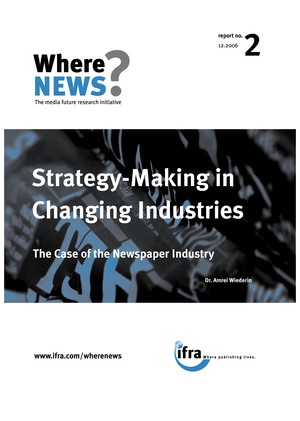Where NEWS? Report 2: Strategy-Making in Changing Industries - The Case of the Newspaper Industry
Where NEWS? Report 2: Strategy-Making in Changing Industries - The Case of the Newspaper Industry

Price
- For non-members: 150 EUR
- For WAN-IFRA members: Free
Download
Employees of WAN-IFRA member organizations can download the report free of charge here, as a membership benefit:
(Note: You do not need your log-in – just your e-mail address.)
Attention non-members: Reports are available for purchase. Please use the contact information at right.
Summary
Newspaper companies are confronted with challenges occurring from a changing environment and need to respond in time if they want to stay in the market in the long run. Hence, the fundamental question is: What does it take to sustainably develop a business in a changing environment? Strategic management is concerned with the sources of sustainable competitive advantage and deals with the fundamental question of what it takes to sustainably develop a business1. The respective actions and activities are summarised in the term strategy-making. Hence, the key question this report is focusing on is: How does strategy-making take place in a changing industry? Most of us have heard the term “strategy” very many times and have used it maybe just as often. But what does the term actually mean? What does it stand for? There is an enormous amount of definitions, some contradicting each other, some complementing each other. In most general terms it can be said that strategic concepts derive from one of the two basic approaches: The classical approach and the processual approach of strategy. The classical approach is also referred to as the planning approach, in which strategies are formulated deliberately and strategy implementation deals with realising an intended (planned) strategy. The approach follows rather systematic and formalised procedures and has been repeatedly attacked ever since the 1980s. The unpredictability of the future as a result of the volatility of the business environment makes systematic strategic planning increasingly difficult. The processual approach highlights the existence of strategies that emerge from a pragmatic process of learning and making compromises. However, what counts in the end is what has been realised: Realised strategies can comprise both deliberate components (intentions defined in advance) and emergent components (the level of replacement and additive strategies). Emergent strategies replace deliberate strategies whenever there is any change between what was intended and what is realised.2 Neither is the intention of this report to give an overview of the very many definitions that exist on strategy and the actions and activities that are comprised in the term strategy-making nor is it geared towards finding all encompassing definitions. The aim is to provide the reader with the feeling of what strategy means and the way strategy-making is actually done in practice. Strategy is just about starting to be of real interest to the newspaper industry. Having enjoyed monopolistic-like market conditions for years the industry is now on the move and its dynamic development is even destined to accelerate in the coming years: The industry finds itself maybe for the first time ever in its 400 years of history in the situation that new business models are needed in order to guarantee the existence of its incumbents in the long-run. The need to change the way of thinking and find new business models has also been highlighted in the first “Where NEWS” report: Business Models of Newspaper Publishing Companies. I want to thank all interviewees for their contributions. Without them the report at hand could not have been made. Especially I want to thank the participating companies.
- Date:
- 2006-12-21
- Language:
- English
- Type:
- WhereNews Report
- Number:
- WNR.02E
- Author:
- Wiederin, Amrei
Contact information
WAN-IFRA Research
Phone: +49-6151-733 742
E-Mail: research@wan-ifra.org

